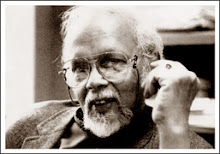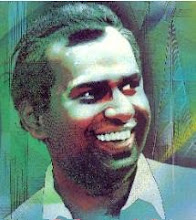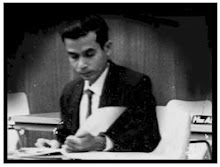 Author: Henry Jayasena
Author: Henry JayasenaSource: Daily News
Date: 22/11/2006
THEATRE: I have a rather interesting record of the activities related to World Theatre Day 1966 in my book ‘Nim Nethi Kathawak - Vol 1’ [A story without an end]. I will translate some of the pages from that book - it should be interesting reading, not only to ‘Theatre People’ so to say, but also to anyone interested in the Arts in these hectic times where the majority of a ‘work weary’ and ‘cost of living weary’ people have very little time or money for the Arts.
If I am not mistaken it was in 1966 that World Theatre Day [27th of March] had been celebrated officially for the first time. The Director of Cultural Affairs at that time had been that quiet and dignified civil servant - Leel Gunasekera. He was a different kind of Govt. servant - courteous, knowledgeable, accessible and deeply concerned about people. He himself is a poet and a writer of immense talent. I am sure at least some of my readers will remember his two soulful novels ‘Athsana’ and Pethsama’ [Signature and Petition]. As part of the activities for that year’s ‘World Theatre Day’, we, meaning my ‘Actors Group’ was sent to Anuradhapura with our play ‘KUVENI’. Let me quote from my book:-
“Outstation shows at that time were mostly organized by our own friends who either lived in those places or who were serving their terms of office in those areas. Or else it was by some society associated with a Kachcheri, a Municipal Council, a Co-operative Society, a Temple or a Church. Earning a lot of money by organizing a play from Colombo was generally not the intention of the organizers in those times. Our friends simply loved to invite us and sort of ‘show us off’ to their friends and to the community in general. Very often our friend was the G.A., the D.R.O. the A.C.L.G. or some such high official in the area. Or else he or she could be a very respected Municipal councillor, a Grama Niladharai or a Govt. Teacher of the area. They liked inviting a group with a good play from the city, introduce them to their friends, entertain them well and light up at least one night of their humdrum lives.
Pleasurable experience
Taking plays out was certainly a much more pleasurable experience in those good old days. It was very seldom that the cast and crew were given ‘buth packets’ for lunch or dinner as it is done now. Lunch and dinner was always served in some home - sometimes in the home of the organizer or, if his place was not spacious enough, in the home of a friend. The host’s friends and relatives too were invariably invited to share the pleasure. Often we were taken to the bed side of a father, a mother, a grandfather or a grandmother and we had a nice chat with the patient. If they requested we would even sing a song or two for the benefit of the patient and they would shed tears of joy. We really enjoyed that kind of touching human relationship. That made us even more determined to give out the best of us on the stage too.
|
|
And so, in 1966 we were sent to Anuradhapura for the World Theatre Day by that benign Sinhalaya, Leel Gunasekera, who was Director of Cultural Affairs at that time. We left by train from the Fort railway station early in the morning. A special compartment was reserved for us. There was a huge banner right along the outside of the compartment. It said ‘World Theatre Day - 1966 - ‘Kuveni’ - Anuradhapura’. I am not sure who was responsible for that banner - whether it was the Cultural Dept. itself or whether we had got it up ourselves. With a man like Leel Gunasekera there, most likely it was the work of the Dept. itself. All I remember is that it was a very pleasurable trip - much like a picnic. The entire cast and crew travelled in the compartment. We carried all our sets, lighting equipment and the musical instruments too. There were sing-songs, organized debates, ‘hitivana kavi’ and of course some card playing too in that railway compartment that nice day!
We arrived at Anuradhapura around mid-day. We had been allotted accommodation in some class, rooms in a school. That would have been good enough for the men, but I thought the ladies needed better accommodation. How could I ask them to pull a few benches together and sleep on them?. So I met the Govt. Agent, Mr. K.M.D. Jayanetti and asked him to help. He promptly ordered that the railway station rooms be given to us. The railway mechanism being rather slow even at that time, we had to kick our heels at the railway station till about six in the evening before the rooms were made ready for us.
The organization there was rather weak. It appears that they had not taken much notice of the instructions received from Colombo. The G.A., Mr. K.M.D. Jayanetti was not even aware that a group was coming from Colombo to celebrate World Theatre Day in his domain. He was rather angry about it. Some smaller official with a big ego may have dealt with this subject. He was visibly annoyed when I insisted that I meet the G.A. “You should not treat us like a batch of school boys and school girls.” I told him firmly. “Even school girls would refuse to sleep in an open class room.” I told him even more firmly. I am sure that self opinionated official would have been taken to task, later, by Mr. Jayanetti. One Mr. Sirisena, Music Inspector of the Education Dept. and one Mr. Arampola helped us a lot when they came to know our situation. Mr, Munasinghe, the Station Master also was helpful in his own ‘slow-coach’ style.
Spirit gum
The matinee show for schools at 2 p.m. was a ‘sweaty’ performance. Since Wijeratne Warakagoda who had taken over the role of the Narrator from me had not turned up, I had to undergo the agony of applying spirit gum [in the sweltering heat!] all over my face and wear that long ‘Rishi’ like beard to play the role. I was cursing Warakagoda all the time. Spirit gum is one make up material that does not agree with me. It gives me goose pimples and makes me utterly intolerant. That was the main reason why I gave over that nice role to Warakagoda.
He played it well. He never complained about the spirit gum or the long beard. In fact he seemed to enjoy it ! Warakagoda should be thankful to me for getting him into Kuveni because that is where he found his future bride. He fell in love with my Disala [Kuveni’s daughter] played by a slim and beautiful girl by the name of Chitra Irangani Jayasinghe and married her a few years later. I was witness to the marriage from Chitra’s side and Mr. Maitripala Senanayake was witness from the groom’s side. Just for the record they have two very talented children. One is Vindhya Warakagoda, leading dancer in Channa Wijewardena’s troup for a long time, and the other is Jananath Warakagoda, drummer par excellence.
The 6.30 show was much ‘cooler’ and attended by practically everybody in Anuradhapura. Just like the Drama Festival of that year, I think it was in 1966 that we had the most meaningful World Theatre Day activities. While we played Kuveni at Anuradhapura, Sugathapala de Silva’s ‘Harima Badu Hayak’ [Six Characters in search of an Author], Prtemaranjith Tillekeratne’s ‘Vahalak Nethi Geyak’ and Dayananda Gunewardena’s ‘Ibi Katta’ were performed in Kandy, Matara and Kurunegala.”
After the performance, Mr. K. M. D. Jayanetti invited all of us to the Anuradhapura Rest House and treated us right royally. Those were the days when a G.A. was king of his district!
Oveflowing house
In my book ‘Nim Nethi Kathawak’, I also have a few more entries that would make interesting reading - 64.08.09 - Prime Minister, Sirimavo Bandaranaike was chief guest at tonight’s performance of Kuveni. There was much security in the hall because of her attendance. All doors were closed and guarded. There was an almost overflowing house. The show was good too. The P.M. came on stage after the show and chatted with us for a little while. A week later she had sent me a cheque for Rs.375/- with a little note of appreciation.
64.08.08 [Saturday] - Janelaya. Manel played Gaayani, while I played Aakaasa. Dr. N.M. Perera - Minister of Finance - was Chief Guest. He came on stage after the performance and told me that at first he was ‘worried’ about the play thinking that it was too pessimistic. “And then when the husband and wife come together in the last scene, I was happy!” Declared N.M., flashing that heart warming smile of his. Later, in Parliament, he had mentioned ‘Janelaya’ in his Budget Speech for that year, when he was dealing with the provisions for the Cultural Ministry.
67.06.10 - Mrs. Theja Gunawardhana came to see Kuveni this evening. She said it is a play that should be translated into English and produced on the local stage. I told her that it has already been done by Nalin Wijesekera with Lylie Godridge’s music - Lylie himself playing the role of the Narrator. Incidentally, later, Theja was a great fan of my Hunuwataye Kathawa. She has told me that she has seen it at least eight times !
When going through these notes of memory I also came across a little scrap book which contains some of the accounts of those days. Let me reproduce just two of them - as a sample of life in the good old days:- 64.03.10 - two dozens of stencils - Rs. 15, 64.03.12 - two packets of copying paper - Rs. 12, 64.03.14 - To roneo operator - Rs.4, 64.03.30 - To book-binder - Rs.2/50. Travelling to Chitra - 2, To Munasinghe - 1, For tea 1, To watcher - 2. The cost of living had gone up by leaps and bounds by the 1970s. I have a bill dated 77.04.06 from the then famous Art Centre Club:- 1 bottle beer - Rs.7, 6 tots of Old Arrack - Rs.7/20, 1 Soda, -/75, I pkt. Cadju - 2/50.
You will of course observe not only the high cost of living but also a measure of our decadence by the mid Seventies !
Thought of the week
Talking of the Art Centre Club, the original space which occupied that lovely water hole has now been turned into an Art Exhibition Gallery. I have climbed those stairs [with difficulty as at now] to see quite a few Art and Photography exhibitions there. All very good and noble and congratulations to the New Management of the Lionel Wendt complex for a nobler use of the space. But frankly, I do miss that water hole that was called the Art Centre Club.
You walk in - or rather climb up - after a performance and you could meet all the stage veterans of the day like Winston and Chandi Serasinghe, Lucien de Zoysa, Sita Parakrama, Earnest McIntyre, Karen Breckenridge, Lucky Wickramanayake, Keerthi Sri Karunaratne, Graham Hatch, Nalin Wijesekera and a host of other unforgettable characters. Not to mention men of the Press such as Nihal Ratnaike, Philip Cooray and many more men and women of the Arts - enjoying a bit of their favourite stuff - why not !





































No comments:
Post a Comment